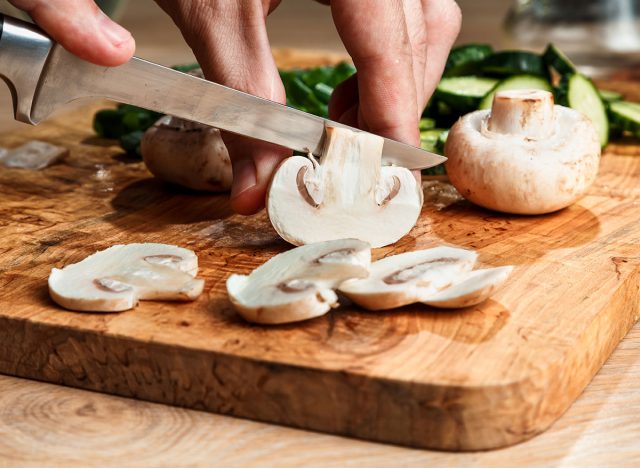Mushrooms are so versatile, it's no wonder they're deemed the "fungi" of the party. There are plenty of delicious recipes you can make out of mushrooms, and it's a great source of health benefits. They also provide nutrients to your body such as Vitamin D and micronutrients that your body rarely gets, without increasing calories, fat, or sodium.
Just when you thought mushrooms couldn't get any better, and not much more could come out of these toadstools, they come bearing yet another benefit. According to our medical expert Laura Burak MS, RD, Founder of GetNaked® Nutrition and author of Slimdown with Smoothies, one major side effect of mushrooms is that mushrooms may help your body adapt to stress better and create more of a homeostasis—the process of internal, physical, and chemical conditions to actively maintain fairly stable conditions necessary for survival.
"You may be hearing the word 'adaptogens' when it comes to mushrooms these days, which is one of the big claims for these new mushroom-based powders, teas, coffees, and elixirs," says Burak. "In short, certain types of mushrooms may help your body adapt to stress better and create more of a balance or homeostasis, something we could all use more of these days. As always though, look at the big picture of your life instead of singling out one food to help with your stress levels and health."
According to a study done by the Journal of Affective Disorders, those who consumed mushrooms like white button, shiitake, and portobello had lower odds of depression than those who did not.
The research used data from the National Health and Nutrition Examination Survey from 2005 through 2016, evaluating 24,699 participants. Two structured 24-hour interviews analyzed and captured detailed information about all mushrooms consumed by the participants.
Depression was measured using the Patient Health Questionnaire multivariable logistic regression models were used for adjusting for any surprise factors. Out of all the participants, 5.9% had depression, and 5.2% consumed the mushrooms, split into three groups. Overall, there were lower odds of depression levels among those who consumed mushrooms versus those who ate little to none.

Due to the boasting benefits mushrooms have, it's understandable if you're looking to incorporate them more into your diet. There are plenty of ways to do so, and other ways to mask the mushroom if you don't physically want to eat the vegetable.
"Shrooms are all the rage in the food world lately, as new products like mushroom-infused coffees, coffee creamers, and even mushroom jerky hit the shelves (and your Instagram feed) on the daily," says Burak. "When cooked, their meaty texture resembles beef, so it can be a great plant food addition for both vegetarians and meat-eaters alike."
Burak also states that mushrooms cook quickly, increasing the volume and nutrition in your meals for minimal calories, meaning they're a great "bang for your nutritious buck." They also add a dose of fiber, B vitamins (which are great for energy levels), selenium and copper for heart and overall health.
"Unlike some healthy-hype foods, mushrooms actually deserve all the nutritious hype as they are powerhouse produce full of vitamins, minerals, and concentrated antioxidants," says Burak.
Two of those antioxidants include ergothioneine and glutathione. When present together in food, they can help prevent aging both on the inside (your brain and cognitive health) as well as on the outside (such as fewer wrinkles).
No comments:
Post a Comment